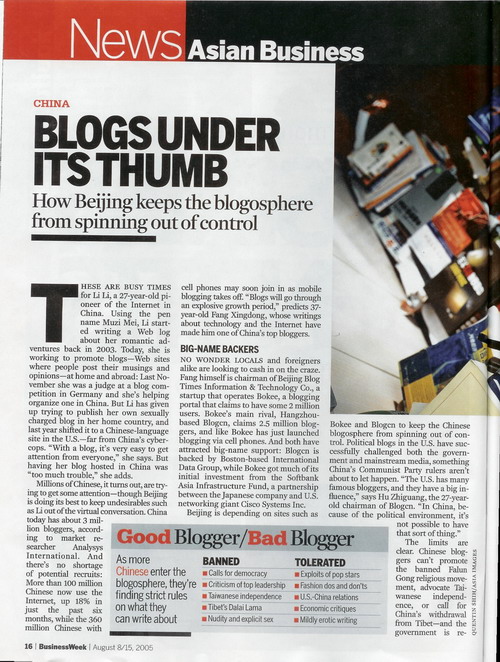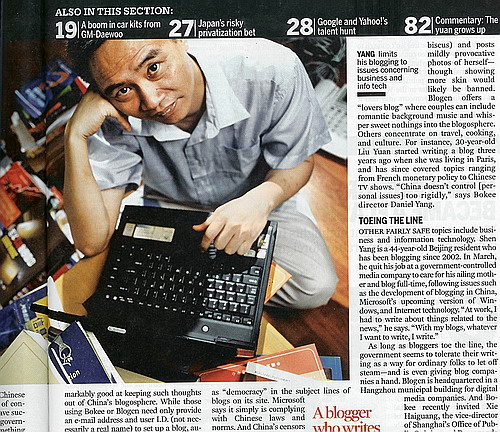Unbending Notes
从木子美到芙蓉姐姐:《商业周刊》眼中的中国博客们
27岁的中国“网络先锋”李丽最近相当忙碌。李最早在2003年开始使用“木子美”的笔名在网络日志上记录自己的罗曼史,而今天,她主力在国内外推动博客。去年11月,她在德国的一个博客大赛中担任裁判。现在,她忙于在中国筹办另外一个。
不过,李丽已经不再致力于在本国撰写其充斥性内容的博客了,早于去年将它转到了美国的一家中文网站,逃避中国网警的监察。“有了博客,很容易就能吸引到所有人的注意。”李丽说。不过,将其博客寄存在中国“太多麻烦了”,她补充说。
虽然北京政府在尽力限制一些令人不快的内容,但似乎仍有数百万人在尝试吸引其他人的注意。根据市场调查公司统计,中国目前有大约300万博客,并且根本不愁后继无人:中国现在有超过一亿网民,另外还有3.6亿的手机用户可能很快加入即将起飞的移动博客行列。
中国著名科技及网络博客方兴东预测说,“博客将进入爆炸性增长阶段。”
幕后大老板
毫无疑问,中国人和外国人都希望将这股热潮转变为金钱。方兴东自己是创办博客中国网站Bokee的主席,号称拥有200万用户,而Bokee的主要对手-杭州的中国博客网Blogcn则号称拥有250万博客,两家都推出了手机博客服务,并且都得到响当当大企业的支持:Blogcn得到了IDC的撑腰,而Bokee则接受了日本软银和美国思科合组的投资基金的注资。
北京依赖Bokee和Blogcn这些网站来控制中国博客们出轨,虽然政治性博客在美国成功影响了政府和主流媒体,但这在中国是不可能发生的。“美国有许多著名博客,影响力很大。”Blogcn年仅27岁的主席胡之光说,“在中国,因为政治环境的问题,这不可能发生。”
中国对博客的限制很清晰,例如不准鼓吹台独等。虽然Bokee和Blogcn此前只需提供一个email地址和用户ID(不必是真名)就可以建立博客,但自六月开始,政府要求其他博客要用政府登记真名注册,方便追查是否越界。(相关报道:中国网络实名制大幕初开)
Blogcn和Bokee都有过滤系统阻止用户发布违禁内容,用户所打的违禁言辞会被转成乱码。一旦有漏网之鱼,两家公司就有可能接到政府要求删贴的电话,不过胡之光称他们在过去两年只接到四、五个这样的电话。
配合内容审查的不仅仅是中国企业,在中国经营业务的合资企业,例如MSN等,也必须合作。微软称他们仅仅是遵守中国的法律和法规而已。
所以,大部分的中国博客内容都集中在不那么敏感的话题上就毫不为奇了。当中最出名的是一位自称“芙蓉姐姐”,今年28岁的陕西女孩。她将自己的一些具有适度煽动性,但又不过份暴露以致遭禁的照片放在了博客上。(相关文章请参看《华盛顿邮报谈芙蓉姐姐狂热现象的本质》)
Blogcn还提供一种“情侣博客”服务,恋人们可以在浪漫的背景音乐下于同一网络空间里互诉心声。其他的主题还包括旅游、烹饪和文化等。例如,一位旅居巴黎的30岁博客刘媛于三年前开始自己的博客日记,内容从法国金融政策到中国的电视节目等。“中国对个人问题其实管得并不太严。”Bokee总裁Daniel Yang说。
底线问题
其他比较安全的主题还有商业和信息科技。44岁的北京人沈阳(sz1961sy)自2002年开始写博客,今年三月,辞去了政府媒体机关的工作照顾生病的妈妈并全职写博客文章,内容包括中国的博客发展、微软的新版Windows以及网络技术等。“工作时,我不得不写些和新闻相关的东西。”他说,“在自己的博客里,我想写什么就写什么。”
只要博客们不越界,中国政府似乎相当容忍一般市民以博客作为发泄的途径,甚至还帮助那些博客企业。Blogcn是总部在杭州市委大楼的数字媒体企业,而Bokee最近则聘请了上海市网宣办副主任谢海光在该公司的大会上致辞。谢海光说,“有了博客,中国13亿人就有了话语权,他们可以自由表达自己的想法。”
中国的新兴博客企业已经在构想下一步了。Bokee计划在年底前完成安装可以应付1000万用户的新设备以及刚接获了1000万美元的投资。Blogcn目前的大部分收入来自eBay等公司的广告费,不过他们在计划发展企业客户,让他们可以黏贴内部通讯。另外,还打算开展其他一些收费服务,例如嫌免费的10MB空间不够,要求更多容量的博客们。
尽管如此,是否有人能利用中国的博客群赚钱还是未知之数。缺少西方大行其道的政治性博客,分析家们担心中国的博客企业很难留住那些新鲜感一旦过去的读者群。Analysys的分析员Sun Lilin认为博客的增长明年会放缓,今年年底时博客人数可能是600万,但到2007年底可能只有700万。“只是为博客而博客是不够的。”他说。
话虽如此,但有如此多的中国人开始接触互联网,应该不乏企业愿意在这样的受查空间内下赌注并谋求获利。
(http://www.donews.com/Content/200508/312b95c7a05540758e3ac310762acaa3.shtm)


商业周刊专稿:Blogs Under Its Thumb
作者:沈阳 2005-07-29 23:17:00 发表于:博客中国
ASIAN BUSINESS
Blogs Under Its Thumb
How Beijing keeps the blogosphere from spinning out of control
By Bruce Einhorn in Beijing, with Heather Green in New York

These are busy times for Li Li, a 27-year-old pioneer of the Internet in China. Using the pen name Muzi Mei, Li started writing a Web log about her romantic adventures back in 2003. Today, she is working to promote blogs <[--]> Web sites where people post their musings and opinions <[--]> at home and abroad: Last November she was a judge at a blog competition in Germany and she's helping organize one in China. But Li has given up trying to publish her own sexually charged blog in her home country, and last year shifted it to a Chinese-language site in the U.S. <[--]> far from China's cybercops. "With a blog, it's very easy to get attention from everyone," she says. But having her blog hosted in China was "too much trouble," she adds. Advertisement
Millions of Chinese, it turns out, are trying to get some attention <[--]> though Beijing is doing its best to keep undesirables such as Li out of the virtual conversation. China today has about 3 million bloggers, according to market researcher Analysys International. And there's no shortage of potential recruits: More than 100 million Chinese now use the Internet, up 18% in just the past six months, while the 360 million Chinese with cell phones may soon join in as mobile blogging takes off. "Blogs will go through an explosive growth period," predicts 37-year-old Fang Xingdong, whose writings about technology and the Internet have made him one of China's top bloggers.
BIG-NAME BACKERS
No wonder locals and foreigners alike are looking to cash in on the craze. Fang himself is chairman of Beijing Blog Times Information & Technology Co., a startup that operates Bokee, a blogging portal that claims to have some 2 million users. Bokee's main rival, Hangzhou-based Blogcn, claims 2.5 million bloggers, and like Bokee has just launched blogging via cell phones. And both have attracted big-name support: Blogcn is backed by Boston-based International Data Group, while Bokee got much of its initial investment from the Softbank Asia Infrastructure Fund, a partnership between the Japanese company and U.S. networking giant Cisco Systems Inc. (CSCO ).
Beijing is depending on sites such as Bokee and Blogcn to keep the Chinese blogosphere from spinning out of control. Political blogs in the U.S. have successfully challenged both the government and mainstream media, something China's Communist Party rulers aren't about to let happen. "The U.S. has many famous bloggers, and they have a big influence," says Hu Zhiguang, the 27-year-old chairman of Blogcn. "In China, because of the political environment, it's not possible to have that sort of thing."
The limits are clear. Chinese bloggers can't promote the banned Falun Gong religious movement, advocate Taiwanese independence, or call for China's withdrawal from Tibet <[--]> and the government is remarkably good at keeping such thoughts out of China's blogosphere. While those using Bokee or Blogcn need only provide an e-mail address and user I.D. (not necessarily a real name) to set up a blog, authorities in June started requiring other bloggers to register their real names with the government <[--]> making it easier to track down anyone who oversteps the limits.
Both Blogcn and Bokee have filtering systems that prevent users from writing about taboo topics. A Blogcn user, for instance, who tries to write "Falun Gong" will find the term converted to gibberish on screen. If a forbidden phrase makes it past the filter, the company might get a call from the police demanding that the offending post be removed. "We can immediately fix it," says Hu, who adds that he has gotten only "four or five" such calls in the past two years. It's not just Chinese companies that cooperate with the censors. A joint venture operated in China by Microsoft Corp.'s MSN blocks words such as "democracy" in the subject lines of blogs on its site. Microsoft says it simply is complying with Chinese laws and norms. And China's censors can intercept traffic from overseas services such as the one that hosts Muzi Mei's blog. For instance, San Francisco-based Six Apart, which is home to some Chinese-language blogs, has been blocked from the mainland twice. "China would be an opportunity for us if a Western company could go in and have a dialogue, but right now that's not the case," says Anil Dash, a Six Apart vice-president.
So it's no surprise that most Chinese bloggers focus on less sensitive topics. Among the most famous is a 28-year-old native of rural Shaanxi Province who calls herself Furong Jiejie (or Sister Hibiscus) and posts mildly provocative photos of herself <[--]> though showing more skin would likely be banned. Blogcn offers a "lovers blog" where couples can include romantic background music and whisper sweet nothings into the blogosphere. Others concentrate on travel, cooking, and culture. For instance, 30-year-old Liu Yuan started writing a blog three years ago when she was living in Paris, and has since covered topics ranging from French monetary policy to Chinese TV shows. "China doesn't control [personal issues] too rigidly," says Bokee director Daniel Yang.
TOEING THE LINE
Other fairly safe topics include business and information technology. Shen Yang is a 44-year-old Beijing resident who has been blogging since 2002. In March, he quit his job at a government-controlled media company to care for his ailing mother and blog full-time, following issues such as the development of blogging in China, Microsoft's (MSFT ) upcoming version of Windows, and Internet technology. "At work, I had to write about things related to the news," he says. "With my blogs, whatever I want to write, I write."
As long as bloggers toe the line, the government seems to tolerate their writing as a way for ordinary folks to let off steam <[--]> and is even giving blog companies a hand. Blogcn is headquartered in a Hangzhou municipal building for digital media companies. And Bokee recently invited Xie Haiguang, the vice-director of Shanghai's Office of Public Opinion and Propaganda Leading Group, to give an address at a company event. "With blogs, 1.3 billion people can all speak," Xie says. "They can very freely express their thoughts."
China's emerging blog companies are trying to figure out the next step. Bokee plans to install equipment allowing it to handle 10 million users by yearend and is about to close on $10 million in new funding. Blogcn gets most of its current revenue from advertisers including eBay, but is planning to charge corporate customers for blogs where companies can post internal communications. And it will soon charge for other services, such as additional storage for bloggers who find the 10 megabytes they get for free isn't enough to handle audio and video content.
Still, it's unclear whether anyone will actually make money from China's bloggers. Without the politically charged blogs that are popular in the West, China's blogging entrepreneurs may find it tough to keep readers from drifting away once the novelty wears off, says Analysys' researcher Sun Lilin. He thinks growth will slow next year, increasing from 6 million bloggers at yearend to 7 million by the end of 2007. "Just doing blogs is not enough, because of the restrictions," he says. Maybe so, but with so many Chinese taking to the Internet, there's no shortage of entrepreneurs betting that even a censored blogosphere is a pretty good place to make a profit.
http://www.businessweek.com/magazine/content/05_32/b3946073.htm?chan=gb